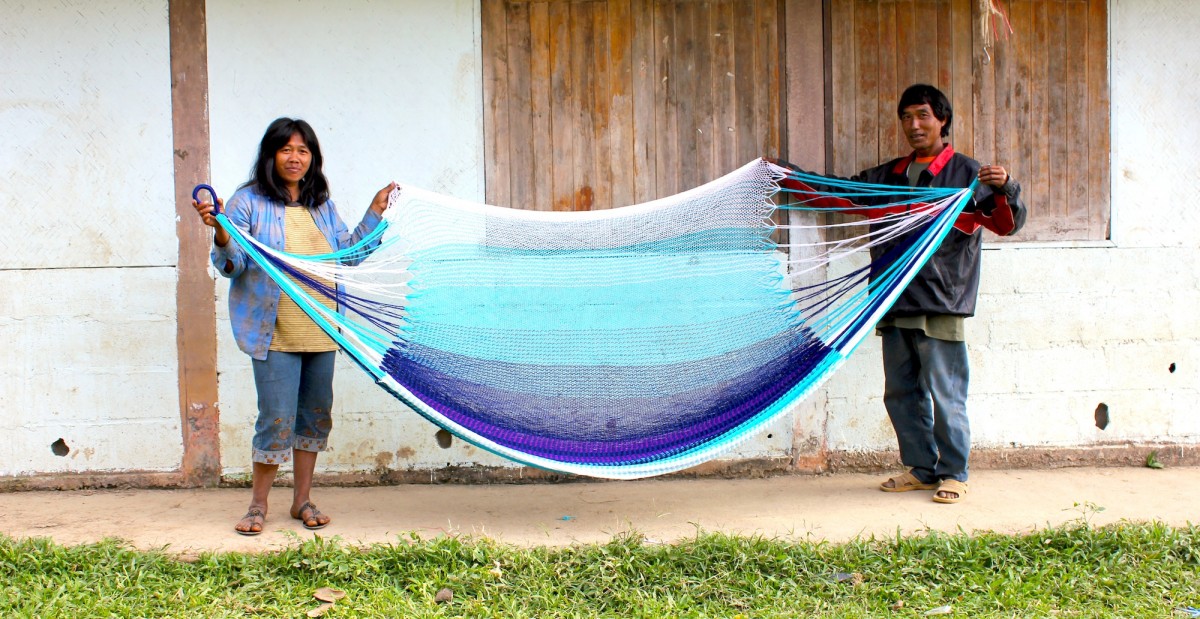For some early-stage ventures, a small loan at the right time is more valuable than a large investment (which may take months).
In the third and final installment of The Real Deal: Getting Impact Investments Done, David Bank of ImpactAlpha hosted Joe Demin and Rachel Connors of Yellow Leaf Hammocks, a social enterprise that creates livelihoods and social justice and Ron and Marlys Boehm of Boma Investments, which provided Yellow Leaf with crucial early capital.
- See the replay of the 30-minute session, “Buyer’s Remorse or Investor’s Delight?”
- See to the replay of Real Deal No. 2, “Coming to Terms.”
- See the replay of Real Deal No. 1, “The Four-Hour Due Diligence.”
The Boehms, a husband and wife team, are well known in the impact investing space for their ‘operator’ approach to investing. Having managed startups in the past, these two bring experience and expertise alongside the capital they invest.
As operators, they are acutely aware of the risk and challenges of taking on too much money, too early. At most investor events, they say, too many entrepreneurs were looking to raise huge sums of money by selling equity in their business, and were expecting to wait for 6-12 months to have cash in the bank. That means less time to focus on the business. Additionally, with little chance of a liquidity event for most social businesses, Ron and Marlys wondered why investors didn’t instead look to debt. The Boehms are big advocates of debt (the right amount of debt) because it means there is no dilution for the entrepreneur, and debt moves more quickly than an equity round.
Debt or Equity?
The Boehms asked the entrepreneurs who were pitching what they would do if they instead had a loan $25,000 tomorrow. For these early-stage businesses, such working capital could boost revenues, increasing the value of the company to future investors.
The Boehms were interested in Yellow Leaf Hammocks because the business was high-impact and could get to scale. They were also impressed with the founders, Joe and Rachel, because of their passion, their story, and what they were able to accomplish by bootstrapping. Finally, Ron and Marlys found the product to be stylish, comfortable, and durable – all key components of a quality hammock.
For Yellow Leaf Hammocks, the loan of $25,000 was transformative. Payments were deferred until revenues increased. The initial loan was used to reduce shipping costs from $40/unit to less than $10/unit.
The first loan was paid back two months early (it’s important to note there was no early repayment penalty). The Boehms then opened up a working capital line of credit, so the entrepreneurs could focus on the business instead of raising capital. As with any working capital line of credit, Yellow Leaf Hammocks didn’t have to pay any interest until they used the credit. Throughout the process, communication was active and Ron and Marlys became an integral part of the team. Joe and Rachel often called the Boehms to ask questions, get advice, and receive guidance on matters from finances to operations.
This initial loan was, to the Boehms, the due diligence phase. By working alongside the entrepreneurs, Ron and Marlys were able to get a better idea of who they were and how they work. Knowing that most startups usually have to pivot early (and sometimes often), the Boehms wanted to determine if the entrepreneurs were collaborative, open-minded to change, and able to make those pivots happen.
Close Contact
For Joe and Rachel, they learned about taking what they need instead of taking what they could get. It was important for a business to analyze and determine exactly what they would do with each dollar, piece by piece. When they set out to raise $350,000 last fall, the Boehms encouraged them to reduce that amount to $100,000, which was easier to deploy and allowed for a smoother ramp up of operations.
For Yellow Leaf Hammocks and, surely, other enterprises, the benefit to securing investments quickly is being able to focus on operations. With this loan, Joe and Rachel feel they can grow at a steady clip instead of raising too much money and feeling too much undue pressure. When reflecting on their relationship with the Boehms, Joe and Rachel felt the investors brought a few key things to the table, including strategic thinking and coalition building with other investors (all of their other investors were introduced to them by the Boehms).
For Ron and Marlys, post-investment relationships vary between entrepreneurs and, even, seasons. Sometimes they speak with their portfolio companies four to five times per week, but others it may be quiet for a month if they don’t want to interfere. Similar issues are faced by many social entrepreneurs, including financial brainstorming, networking opportunities, internal and external messaging, and, perhaps the most important, preparing for what’s coming next for the business.
The author is a Research Fellow at ImpactSpace and ImpactAlpha. All information is meant for educational purposes and should not be construed as an offer to invest or as investment or financial advice.











